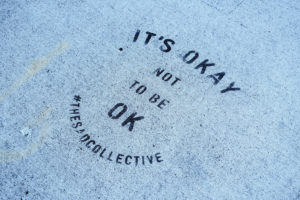
“Sometimes I cry when I am laughing so hard and my sides hurt,” I smile as I talk to my six year old niece. “Yes, tears just start falling out of my eyes!”
“It’s the same water that’s in your nose,” she says matter-of-factly.
“And sometimes I cry when I am feeling sad or lonely. Do you ever cry when you feel sad or lonely?”
She nods her head up and down, her big brown eyes filled with knowing.
“It’s okay to cry, no matter what you are feeling. I just wanted you to know that I will always love you,” I whisper with tears in my eyes.
This kindergartener is a long way off from her freshman year of high school, but she’s not too young for “the talk” about mental health. Teaching our children that it’s okay to not be okay is just as important as teaching them to look both ways before crossing the street. Both lessons are designed to prevent harm and keep our children safe.
On April 1, 2022, the Center for Disease Control released a new report and the data confirms what too many families and schools already knew: our youth are not okay. In a national survey, nearly half of the high school students reported feeling sad most of the time.
While it’s okay and even healthy to feel sadness sometimes as part of the full range of human experience, the persistent nature of this pandemic of sadness creates chronic levels of stress that will have a lifelong impact on youth. We have a whole generation of youth whose mental health is in crisis with the highest rates of youth suicide we have ever seen.
This is personal for me. We lost a family member to suicide during the first year of the pandemic. She was only 16. That is why I am having “the talk” now with my six year old niece.
And it’s why all of us need to break the silence with children and teens about mental illness. It’s why I wrote Blesses Youth and the Blessed Youth Survival Guide for teens to create a personalized safety plan to prevent self-harm and suicide. (Learn more about Blessed Youth here)
The CDC report also confirms what we know in our gut: youth who feel connected to others have better mental health. The feeling of being socially disconnected, alone, and isolated from peers, friends, and family is bad for mental health. The youth who felt disconnected had double the rate of attempted suicide. The report shows that the connections can be in-person or online, it doesn’t matter, the thing that matters most is knowing you are not alone.
Now is the time for faith communities, schools, families, and community organizations to come together to support youth mental health. Together we can create networks of care and connection. Let’s leave no child disconnected.

Rev. Dr. Sarah Lund (she/her/hers)
Rev. Dr. Sarah Lund (she/her/hers) serves on the national staff of the United Church of Christ as Minister for Disabilities and Mental Health Justice. She also serves as senior pastor of First Congregational UCC of Indianapolis, IN. Sarah is the author of the acclaimed and best selling books “Blessed Are The Crazy: Breaking the Silence About Mental Illness, Family and the Church“ (Chalice Press, 2014) and “Blessed Union: Breaking the Silence About Mental Illness and Marriage (Chalice Press, 2021). She blogs at www.sarahgriffithlund.com.